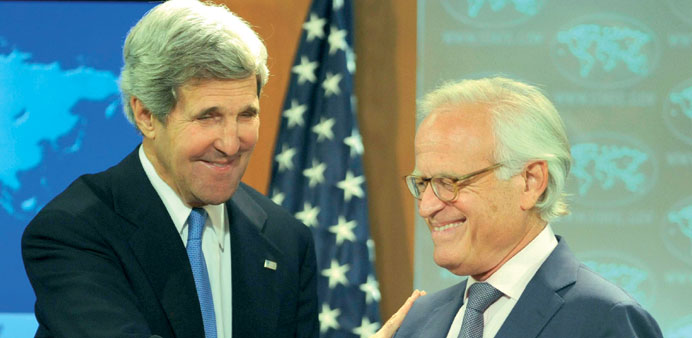|
|
US Secretary of State John Kerry yesterday called for Israel and the Palestinians to make “reasonable compromises” for peace as he prepared to preside over their first direct negotiations in nearly three years.
“It is no secret this is a difficult process. If it were easy, it would have happened a long time ago,” Kerry said with his newly-named envoy for Israeli-Palestinian peace, former US ambassador to Israel Martin Indyk, at his side.
“It is no secret, therefore, that many difficult choices lie ahead for the negotiators and for the leaders as we seek reasonable compromises on tough, complicated, emotional and symbolic issues,” Kerry told reporters.
In a sign of the challenges, the parties differed in public about the agenda for the talks, with an Israeli official saying all issues would be discussed simultaneously and a Palestinian official saying they would
start with borders and security.
The US is seeking to broker an agreement on a “two-state solution” in which Israel would exist peacefully alongside a new Palestinian state created in the West Bank and the Gaza Strip, lands occupied by the Israelis since a 1967 war.
The major issues that need to be resolved to bring an end to more than six decades of conflict include borders, the future of Jewish settlements on the West Bank, the fate of Palestinian refugees and the status of Jerusalem.
The resumption of peace talks is an achievement for Kerry, who made six trips to the region in the past four months to get the two sides to the table. The talks, slated to last nine months, began over dinner at the State Department yesterday and will continue today.
In a statement, President Barack Obama urged both sides to negotiate in good faith.
“The most difficult work of these negotiations is ahead, and I am hopeful that both the Israelis and Palestinians will approach these talks in good faith and with sustained focus and determination,” Obama said. “The US stands ready to support them throughout these negotiations.”
The talks are being conducted by senior aides to Israeli Prime Minister Benjamin Netanyahu - Israel’s Justice Minister Tzipi Livni and Yitzhak Molcho - and to Palestinian President Mahmoud Abbas - represented by Saeb Erekat and Mohamed Ishtyeh.
Even Indyk, who has previously served as the top US diplomat for the Middle East and twice as US ambassador to Israel, noted that when Kerry began his efforts this year almost no one thought he would succeed in reviving the negotiations.
“You took up the challenge when most people thought you were on a mission impossible,” Indyk said.
Indyk is a veteran of US efforts to resolve the Israeli- Palestinian conflict. He was a senior official in President Bill Clinton’s administration, which oversaw a failed summit in 2000 after which violence erupted in Israel and the Palestinian territories.
The last direct negotiations collapsed in late 2010 over Israel’s construction of Jewish settlements on land it occupied in a 1967 Middle East war.
Previous attempts to resolve the conflict have sought to tackle easier disputes first and defer the most emotional ones like the fate of Jerusalem and Palestinian refugees.
This time, “all of the issues that are at the core of a permanent accord will be negotiated simultaneously”, Silvan Shalom, a member of Netanyahu’s cabinet and rightist Likud party, told Israel’s Army Radio.
PLO faction rejects negotiations
A major faction of the Palestine Liberation Organisation rejected new peace talks with Israel just hours before their scheduled resumption in Washington yesterday after a three-year break. The leftist Popular Front for the Liberation of Palestine said that talks’ resumption was a unilateral move by Palestinian leader Mahmoud Abbas which did not have the backing of the PLO as a whole. “The PFLP is against a return to negotiations,” said one of the party’s leaders, Khaleda Jarar. “It is an individual move,” she said, in allusion to Abbas. The Hamas group has earlier rejected the resumption of the talks.

